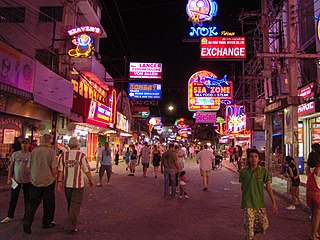
Sexual slavery and sexual exploitation is an attachment of any ownership right over one or more people with the intent of coercing or otherwise forcing them to engage in sexual activities. This includes forced labor that results in sexual activity, forced marriage and sex trafficking, such as the sexual trafficking of children.

A brothel, bordello, bawdy house, ranch, house of ill repute, house of ill fame, or whorehouse is a place where people engage in sexual activity with prostitutes. However, for legal or cultural reasons, establishments often describe themselves as massage parlors, bars, strip clubs, body rub parlours, studios, or by some other description. Sex work in a brothel is considered safer than street prostitution.

Prostitution in Germany is legal, as are other aspects of the sex industry, including brothels, advertisement, and job offers through HR companies. Full-service sex work is widespread and regulated by the German government, which levies taxes on it. In 2016, the government adopted a new law, the Prostitutes Protection Act, in an effort to improve the legal situation of sex workers, while also now enacting a legal requirement for registration of prostitution activity and banning prostitution which involves no use of condoms. The social stigmatization of sex work persists and many workers continue to lead a double life. Human rights organizations consider the resulting common exploitation of women from East Germany to be the main problem associated with the profession.

A massage parlor, or massage parlour, is a place where massage services are provided. Some massage parlors are front organizations for prostitution and the term "massage parlor" has also become a euphemism for a brothel.

Prostitution in Thailand is not itself illegal, but public solicitation for prostitution is prohibited if it is carried out "openly and shamelessly" or "causes nuisance to the public". Due to police corruption and an economic reliance on prostitution dating back to the Vietnam War, it remains a significant presence in the country. It results from poverty, low levels of education and a lack of employment in rural areas. Prostitutes mostly come from the northeastern (Isan) region of Thailand, from ethnic minorities or from neighbouring countries, especially Cambodia, Myanmar, and Laos. In 2019, the Joint United Nations Programme on HIV/AIDS (UNAIDS) estimated the total population of sex workers in Thailand to be 43,000.

Prostitution in Japan has existed throughout the country's history. While the Prostitution Prevention Law of 1956 states that "No person may either do prostitution or become the customer of it", loopholes, liberal interpretations and a loose enforcement of the law have allowed the Japanese sex industry to prosper and earn an estimated 2.3 trillion yen per year.
Prostitution is illegal in Russia. The punishment for engagement in prostitution is a fine from 1500 up to 2000 rubles. Moreover, organizing prostitution is punishable by a prison term. Prostitution remains a very serious social issue in Russia.
Prostitution in Hong Kong is itself legal, but organised prostitution is illegal, as there are laws against keeping a vice establishment, causing or procuring another to be a prostitute, living on the prostitution of others, or public solicitation.
Forced prostitution, also known as involuntary prostitution or compulsory prostitution, is prostitution or sexual slavery that takes place as a result of coercion by a third party. The terms "forced prostitution" or "enforced prostitution" appear in international and humanitarian conventions, such as the Rome Statute of the International Criminal Court, but have been inconsistently applied. "Forced prostitution" refers to conditions of control over a person who is coerced by another to engage in sexual activity.

A bargirl is a woman who is paid to entertain patrons in a bar or nightclub. Variants on the term include "B-girl" and "juicy girl". Many bargirls work as a bar hostess, engaging individual customers in conversation. They may also provide them with sexual entertainment such as a lap dance, or offer to sell them sexual services. Some bargirls work as a bar dancer providing more public entertainment, often in the form of an erotic dance, go-go dance or striptease. The exact nature of the entertainment varies widely from place to place, depending on the venue.
Prostitution in the Philippines is illegal, although somewhat tolerated, with law enforcement being rare with regards to sex workers. Penalties range up to life imprisonment for those involved in trafficking, which is covered by the Anti-Trafficking in Persons Act of 2003. Prostitution is available through bars, karaoke bars, massage parlors, brothels, street walkers, and escort services.
Prostitution in Singapore in itself is not illegal, but various prostitution-related activities are criminalized. This includes public solicitation, living on the earnings of a prostitute and maintaining a brothel. In practice, police unofficially tolerate and monitor a limited number of brothels. Prostitutes in such establishments are required to undergo periodic health checks and must carry a health card.

Prostitution is the business or practice of engaging in sexual activity in exchange for payment. The definition of "sexual activity" varies, and is often defined as an activity requiring physical contact with the customer. The requirement of physical contact also creates the risk of transferring infections. Prostitution is sometimes described as sexual services, commercial sex or, colloquially, hooking. It is sometimes referred to euphemistically as "the world's oldest profession" in the English-speaking world. A person who works in the field is usually called a prostitute or sex worker, but other words, such as hooker and whore, are sometimes used pejoratively to refer to those who work as prostitutes.

Prostitution in Vietnam is illegal and considered a serious crime. Nonetheless, Vietnam's Ministry of Labour, Invalids and Social Affairs (MOLISA) has estimated that there were 71,936 prostitutes in the country in 2013. Other estimates puts the number at up to 200,000.
Prostitution in Indonesia is legally considered a "crime against decency/morality", although it is widely practiced, tolerated and even regulated in some areas. Some women are financially motivated to become prostitutes, while others may be forced by friends, relatives or strangers. Traditionally, they have met with customers in entertainment venues or special prostitution complexes, or lokalisasi (localization). However, recently internet forums and Facebook have been used to facilitate prostitute-client relations. In recent years, child sex tourism has become an issue at the resort islands of Batam and Bali.
Prostitution in Malaysia is restricted in all states despite it being widespread in the country. Related activities such as soliciting and brothels are illegal. In the two states of Terengganu and Kelantan, Muslims convicted of prostitution may be punishable with public caning.

The sex industry consists of businesses that either directly or indirectly provide sex-related products and services or adult entertainment. The industry includes activities involving direct provision of sex-related services, such as prostitution, strip clubs, host and hostess clubs and sex-related pastimes, such as pornography, sex-oriented men's magazines, women's magazines, sex movies, sex toys and fetish or BDSM paraphernalia. Sex channels for television and pre-paid sex movies for video on demand, are part of the sex industry, as are adult movie theaters, sex shops, peep shows, and strip clubs. The sex industry employs millions of people worldwide, mainly women. These range from the sex worker, also called adult service provider (ASP), who provides sexual services, to a multitude of support personnel.

Prostitution has been practiced throughout ancient and modern cultures. Prostitution has been described as "the world's oldest profession", though this is unverifiable, and most likely incorrect.

Karayuki-san (唐行きさん) was the name given to Japanese girls and women in the late 19th and early 20th centuries who were trafficked from poverty-stricken agricultural prefectures in Japan to destinations in East Asia, Southeast Asia, Siberia, Manchuria, British India, and Australia, to serve as prostitutes.

Sandakan Japanese Cemetery is an old graveyard in Sandakan, Sabah, Malaysia. Located on a hill about 2 kilometres from the town's central business district, it is a cemetery where the remains are buried of many Japanese female prostitutes called Karayuki-san from poverty-stricken agricultural prefectures in Japan who were sold into slavery at a very young age years before World War II which also include recent comfort women during the war. It is part of the Sandakan Heritage Trail.











